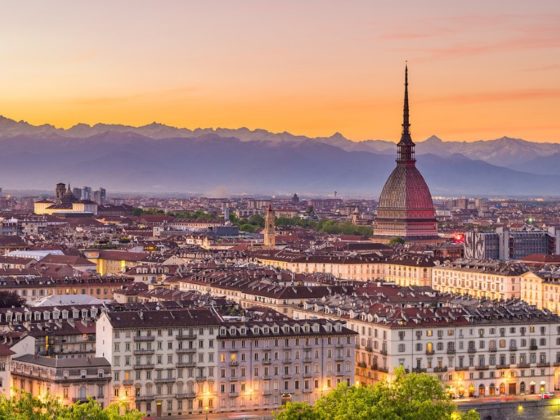The call for applications was sent out — and seventeen Italian cities said that they wanted in.
Yes, a whopping seventeen cities — some obvious, others very surprising — expressed their interest in hosting the next edition of the Eurovision Song Contest in 2022. We haven’t seen a number this high since 2011, when the initial selection for the host city in Germany had no less than 23 candidates at the get-go. That number then became 8, then 4 and finally one — Düsseldorf.
But in recent days Italian newspaper La Stampa reported that only 11 cities actually submitted the required dossiers to the Italian broadcaster Rai. Our friends at Italian-language web site EuroFestival News subsequently reported that the 11 cities still in contention are:
The following six cities previously expressed interest but did not send in their documents. They are reportedly out of consideration.
- Bertinoro di Romagna
- Florence
- Jesolo
- Matera
- Trieste
- Viterbo
So, what does the city (and venue) selection look like now?
Below we have a look at the rules and criteria of Rai and the EBU. Then we review the candidate cities that have a realistic shot — and those that are just in it “for the glory” and publicity, since they don’t meet the minimum requirements to host this major event.
We will review the 11 cities that remain in contention, as well as the six that are reportedly out…just in case something changes in the coming weeks.
Eurovision 2022 host city: selection process and criteria
The host city will be selected by Rai based on a series of requirements established by the EBU.
The submission of the final proposals to Rai and the EBU is expected in the coming weeks, and Rai will announce the winning city by the end of August 2021.
The requirements are described in a detailed document called the ‘Bid Book‘, which was sent to the cities that expressed their interest in hosting the event by Monday, July 12.
In short, the host city must have:
- An international airport no more than 90 minutes from the city.
- Over 2,000 hotel rooms in the area close to the event.
- Infrastructure (stadium/venue/centre) capable of hosting a large-scale live broadcast with the minimum requirements listed below.
- An indoor space with air-conditioning and a well defined perimeter.
- An audience capacity in the main hall of around 8,000 – 10,000 during the event.
- A main hall with the capacity to house the set and all other requirements needed to produce a high level broadcast production (this includes good specifications of load capacity in the roof, clearance to low beams, easy load in access, etc).
- Ample space within easy access of the main hall to support additional production needs, such as: a press centre, delegation spaces, dressing rooms, artist facilities, staff facilities, hospitality, audience facilities, etc.
- Exclusive availability for 6 weeks before the event, 2 weeks during the show (which will take place in May) and a week after the end of the event for dismantling.
Timeline recap
July 12: Application submission deadline
August 4: Deadline to submit detailed projects and proposals
End of August (date unspecified): Announcement of the winning city by Rai
Now that we know the requirements, which candidates have what it takes to host ESC 2022? Let’s find out…
The not-so-likely to go through
This category includes cities and towns with excellent project proposals, but sub-par logistics, a lack of funds or inadequate venues. We consider them the least likely to come out on top.
Acireale and Palazzolo Acreide
View this post on Instagram
Both Sicilian, both small towns, both determined to bring Eurovision to the largest island in the Mediterranean Sea. They are Acireale and Palazzolo Acreide, located in the provinces of Catania and Syracuse.
While we don’t have much information about Acireale’s plans, Palazzolo Acreide teased a fully-formed proposal.
“Of course. And we are ready to get to work,” declared the deputy mayor Maurizio Aiello to the website Siracusa Oggi.
“We have a vision. I can’t anticipate much, but ours is a widespread program on the territory. It is clear that Palazzolo alone could not do everything. Other cities will have to support us: Syracuse, Noto, Avola, Ferla…”
Regarding the venue requirements, Aiello is quite hopeful: “With the classical theater festival for young people at Teatro di Akrai, we were able to manage over 5,000 admissions for up to two years. Why shouldn’t we be able to repeat the experience with Eurovision?”
The organization also requires a minimum distance from the international airport.
“Fontanarossa (Catania’s airport) falls within the required distance. For now, don’t ask me more. Everything will be in the dossier that will be sent to Rai.”
Teatro di Akrai
Alessandria
View this post on Instagram
Alessandria is a city located in the south of the Piedmont region, and it’s the capital of the eponymous province.
The idea of participating came from the councillor for events Cherima Fteita, who declared the following to the newspaper La Stampa: “We didn’t want to miss this opportunity. It was all very fast. […] We took this decision almost by instinct.”
Malpensa airport in Milan is close enough to the city, but what about hotel rooms?
“If we put all the structures together, we will find them,” replies the councillor optimistically.
Then again, the city lacks a proper venue for the event. Someone on social media proposed the “Cittadella”, but in a rather ironic way since it’s not indoor.
Cittadella
Genoa and Sanremo
View this post on Instagram
Both located in the Liguria region, Genoa and Sanremo would bring the contest to the most significant geographical area for Italian music. Sanremo is in fact the setting of the internationally renowned “Festival della canzone italiana” (Italian song festival), whose winner is officially invited to represent Italy at Eurovision every year.
While we don’t know much about Genoa’s plans, the councillor for tourism of Sanremo, Giuseppe Faraldi, declared the following to La Stampa: “It is not a joke, even if we are aware that cities like Milan and Rome have more chances. Let’s not forget that Måneskin’s success at the Eurovision Song Contest 2021 is the direct consequence of their victory at the last Sanremo Festival.”
In this regard, the mayor of Sanremo Alberto Biancheri had the opportunity to share his thoughts, too: “Our city played a key role in the goal reached by Måneskin, winners of the Festival and therefore protagonists at Eurovision. I thought it would only be fair to present the candidacy of Sanremo. If the event were to be held elsewhere, I strongly believe that Sanremo should be involved in some way, either directly by Eurovision, or with collateral events and connections.”
In the case of Sanremo, the venue could be hypothetically set in the area of the Flower Market in Valle Armea, while the location in Genoa could be the PalaFiumara.
Sanremo’s Flower Market
The pleasant surprises (but still unlikely to win the race)
This category includes cities that meet many of the requirements and have submitted fairly detailed proposals, but do not have the same amenities and services as other larger candidate cities. They have a stronger chance than the previously mentioned cities, but should definitely be considered outsiders.
Rimini
View this post on Instagram
A popular destination among European tourists, Rimini is a lovely town by the sea in Romagna.
Being a historic hospitality landmark in Italy, Rimini has all the credentials to seize this extraordinary opportunity: enormous accommodation and service capacity, logistics, adequate structures in the area, skills and know-how.
“The city of Rimini,” says the mayor Andrea Gnassi on the city’s official website, “meets all the requirements: it has an international airport less than an hour and a half away, offers over 1,100 hotels with more than 36,000 rooms and a multifunctional infrastructure suitable for hosting the event.”
The widespread presence of services, infrastructures and logistics, combined with the truly unique scenario of natural, historical and artistic excellence of the city, has the potential to make Rimini an unexpected but pleasantly surprising host city.
The city’s Fair is undoubtedly a flagship of Rimini’s candidacy, with a height of 20 meters and 16 pavilions.
Rimini’s fair
Pesaro
View this post on Instagram
Pesaro, a UNESCO City of Music in the region of Marche, was among the first cities to announce its candidacy to host Eurovision.
The mayor Matteo Ricci and the deputy mayor Daniele Vimini declared the following in a note on the city’s official website: “We fall within all the parameters required for participating….The presence of an international airport that is no more than an hour and thirty minutes away, a hotel offering of over 2,000 rooms in areas adjacent to the event and an infrastructure, the Vitrifrigo Arena, which meets the necessary criteria.”
Pesaro, they added, “boasts an important musical tradition in continuous evolution, and a dynamic cultural life that has constantly fostered a climate of experimentation and dialogue between all the arts.”
The city’s sports hall, Vitrifrigo Arena, perfectly meets the requirements with its 10,000 seats, and the urban area of Pesaro has 52 hotels with a total of 2,603 rooms.
Holidays turnout could be dealt with by diverting tourists to Fano (12 kilometers away by car), which has 2,090 beds and 1,152 rooms, or to Rimini which is 45 minutes from Pesaro and can count on the facilities of the Riviera.
Rimini would be the support city for the international airport, with its “Federico Fellini” airport just 38 minutes away by car.
Vitrifrigo Arena
The superstars (a.k.a., the cities with the best shot)
The Eurovision 2021 host city will likely come from this group. In fact, only 4 out of the 17 original candidates meet all the criteria imposed by Rai and the EBU, paired with a series of attractions, amenities and sufficient funds to host such a large-scale event.
Milan
View this post on Instagram
Milan, in Lombardy, is a major European hub, a cosmopolitan and modern city, as well as the economic heart of the country.
With three international airports within reach (Linate, Malpensa and Orio al Serio) and efficient ground transportation between the airports and Milan Central Station, it can certainly guarantee excellent connections, numerous hotel rooms and a wide range of services.
The City Councillor for Culture Filippo Del Corno commented: “Milan would be the ideal city to host Eurovision: the record industry is based here, music is produced and consumed here and here is an Rai headquarters with an important history.”
According to the councillor, it is time for the event to be hosted in the North, after the editions that took place in Rome (1991) and Naples (1965).
Assago Forum (currently Mediolanum Forum) is the most likely venue to be selected, with a structure capable of hosting up to 12,700 spectators.
The Forum has additional rooms, which can be perfect for setting up a press center or a separate Green Room.
The structure is well-connected to the rest of the city thanks to a dedicated stop on the M2 (green) metro line, the same line that connects the main railway stations.
The only downside? The height of the structure is 16.40 meters, slightly lower than the 18 meters required by the EBU.
A great alternative could be Palazzo delle Scintille, located in the City Life district, right next to three out of the five tallest skyscrapers in Italy (and not far from the Rai production center in Corso Sempione), in an area well served by public transport.
Mediolanum Forum (Assago Forum)
Turin
View this post on Instagram
The capital of Piedmont, Torino, is an important business and cultural centre in northern Italy.
The mayor Chiara Appendino wrote in a letter addressed to Rai that “the City of Turin meets all the required criteria, and has a particularly suitable and functional location for hosting the initiative in the immediate vicinity of the city center.”
The structure Appendino refers to is the Pala Alpitour, with a good capacity (more than 13,000 seats) and suitable internal volumes (18 meters of height).
Along with the venue, “there are a whole lot of other factors that could reward the city,” Appendino added, “like the proximity of an international airport, infrastructures on the territory, and accommodation capacity. Turin also has a certain fame, given that the capital in the coming years will host top-level international events, such as the ATP Finals.”
Bologna
View this post on Instagram
Among the most interesting candidates to host ESC 2022, Bologna, the capital of the Emilia-Romagna region, can count on one of the largest arenas in Italy, the Unipol Arena.
Located in Casalecchio di Reno, the arena has a capacity of approximately 18,000 spectators, with a structure height of 30 meters.
The Arena is located within a large commercial park (Shopville Gran Reno) but has no neighbouring structures that can be used as a press center. An alternative solution, in this case, could be the installation of a pavilion structure in the parking lot (similar to makeshift press center we saw in Copenhagen, for instance).
Unipol Arena can be reached from Bologna with extra-urban bus lines (83, 94 and 671) in about 30/40 minutes.
An alternative venue could be Bologna Fiere, about 3 km from the historic center.
The area is served by TPER buses, and the venue has several recently built pavilions, but with a height limit (only 12 meters) well below what is required by the EBU (about 18 meters).
Unipol Arena
Rome
View this post on Instagram
Despite having already hosted Eurovision in 1991 (at the Cinecittà studios), Rome certainly can’t be excluded from the “superstars” list.
The eternal city is not only stunning and timeless, but it’s also the home town of Måneskin, which offers a nice continuity with the last edition of Eurovision.
Following their victory, the mayor Virginia Raggi tweeted: “Måneskin’s was a fantastic victory. Rome is proud of you guys. Next year Italy will host the Eurovision Song Contest 2022. Rome is the perfect stage to relaunch the challenge.” In short, according to Raggi, Roma is there and is ready.
The Italian capital can count on two airports (Fiumicino and Ciampino), and in terms of accommodation capacity there are more than 145,000 beds and over 71,000 rooms among hotels and similar structures, by far the best out of all the cities taken into consideration.
What about the venue? Palazzo dello Sport, the largest event structure in the capital, has a maximum capacity of over 10,500 seats (10,000 with a stage). The structure’s height is 35 meters.
A critical issue, however, is the vaulted ceiling which does not allow hanging suspended loads, normally used in Eurovision performances.
Palazzo dello Sport
These cities will not host Eurovision 2022
The following six cities did not submit the required dossiers to the Italian broadcaster. Therefore it’s safe to assume they will not be considered as potential hosts of Eurovision 2022.
The doomed ones
This category includes cities that did not in any way meet the requirements imposed by the EBU. They may have entered the race purely for publicity.
Trieste
View this post on Instagram
Let’s clear this up right away: Trieste simply doesn’t have what it takes to host ESC (no suitable venue, no press center and not enough hotel rooms). So why did the “city of the three winds” decide to submit its candidacy?
Well, let’s say it was all a big misunderstanding, mixed with a good dose of Italian carelessness.
The candidacy presented on July 12 was not shared with the councillor for major events Francesca De Santis, nor with the city mayor Roberto Dipiazza.
The vice-mayor Paolo Polidori was the one signing the document, despite the fact that the city could not meet the requirements set by RAI and EBU.
Polidori explained to local newspaper Il Piccolo di Trieste that “the mayor was out of office.”
A weird circumstance confirmed by De Santis herself: “I had evaluated the possibility of hosting the event in Trieste, and contacted a friend in RAI. […] I had a meeting with the city hall to understand if it made sense to submit the candidacy.”
“Learning that the necessary requirements were not met, I decided not to go any further. The same municipal manager I had met with, however, informed me on July 13 that the application was sent the night before.”
The councillor for economic activities Serena Tonel added: “We simply expressed our interest, it wasn’t a real candidacy.”
Viterbo
View this post on Instagram
Along the same lines of Trieste, the candidacy of Viterbo does not look very well thought out.
The capital of Tuscia presented an incomplete dossier, which has been heavily criticized by the local press.
The city’s exhibition center is a private structure, unable to hold 8,000 spectators and with a height of less than 18 meters.
“Dreaming costs nothing. It was enough to send a PEC (certified email),” the councillor for culture Marco De Carolis commented to the local website TusciaWeb.
“We compete with very important cities. If we don’t make it, at least we tried.”
His enthusiasm, however, clashed with the realism of the mayor Giovanni Arena: “The application was presented independently by the Department of Culture. Both logistically and economically, I see huge difficulties.”
The not-so-likely to go through
This category includes cities and towns with excellent projects. Unfortunately, they lack the logistics, facilities, funds or venues to make a compelling case.
Matera
View this post on Instagram
Known as “la città dei sassi” (the city of stones), Matera was elected European capital of culture in 2019.
However, as far as the ESC candidacy goes, it doesn’t look like the ideal host city.
Giuseppe Digilio, councillor for productive activities of the Municipality of Matera, spoke on the matter: “There are difficulties above all in terms of resources, but we will proceed to prepare the dossier with the information requested to us. We believe in the collaboration of the municipality and the Matera Basilicata 2019 Foundation to be able to carry out this project.”
Unlike other cities, Matera didn’t receive the support of its Region (Basilicata), but the councillor nevertheless provided some details on the project that will be submitted to Rai: “We’d like to use ‘Parco delle Cave’ – which, with some roofing interventions, could be suitable to ensure the spaces required by Rai and EBU.”
Parco delle Cave, particularly Cava del Sole, is an outdoor archaeological area characterized by magnificent stone structures.
Therefore, roofing works would be necessary to obtain an area suitable for organizing the event. An expensive – and quite unrealistic – requirement for Matera, which is unlikely to make it without the support of the Region.
Cava del Sole, Matera
Bertinoro di Romagna
View this post on Instagram
Situated in the province of Forlì, Bertinoro is a small town of around 10,000 inhabitants in the region of Emilia-Romagna.
On paper this doesn’t look like a promising premise, but the proponents don’t want to stop dreaming: “Even our national football team was not really among the favorites in the Euros,” commented to Il Resto del Carlino Massimo Medri, member of the Pro Loco (association promoting local culture and tourism) “and we all know how it ended. We’ll make our best efforts to support our candidacy on behalf of the whole Romagna region.”
The event would be hosted at the Forlì sports hall, which has a capacity of 9,000 seats and a height of over 18 meters. The press center would be located at the Carisport in Cesena, while hospitality would be guaranteed by the hotels by the sea: Bertinoro would be in charge of managing and directing at the University Center in the bishop’s fortress.
In support of the cities of Bertinoro and Rimini, the parliamentarian Marco Di Maio declared that “the whole territory supports this opportunity, which would bring transversal and significant benefits for all.”
The mayor of Bertinoro, Gabriele Fratto, is ready to lend a helping hand. “Dreaming big never hurts, the Eurovision Song contest is a good opportunity: we will help the Pro loco.”
Forlì sports hall
The pleasant surprises
This category includes cities that meet many of the requirements and have submitted fairly detailed projects, but do not have the same amenities and services as other larger candidate cities.
Jesolo
View this post on Instagram
A seaside resort town just outside Venice, Jesolo can boast a strategic position, close to one of the most visited destinations in Italy, as well as the charm of a seaside village.
“Ours is a city with an international vocation, used to hosting and organizing large events” commented the president of the JesoloVenice Tourist Company Consortium, Luigi Pasqualinotto, to the local broadcaster TeleVenezia.
“With regard to the requisites — continues Pasqualinotto — we are aware of how difficult it is to compete with other realities, but we are able to fully count on a widespread hotel accommodation capacity (with 370 hotels) and on the proximity to two airport hubs, Venice and Treviso, which are respectively 30 and 45 minutes away from our city.”
“As for the venue, in addition to PalaInvent and the possibility of implementing synergies with the territory, Jesolo has a unique location: the lighthouse area (where international musical events have been held, such as the ‘Mtv and the Full Moon Dj Superstar’) can hold up to 15,000 people with adequate spacing, in a unique and extraordinary atmosphere that is difficult to replicate in other realities.”
View this post on Instagram
PalaInvent
Florence
View this post on Instagram
One of the most loved and visited Italian cities by tourists from all over the world, Florence would undoubtedly be among the most romantic settings for Eurovision.The president of the Culture Commission, Cristina Giachi, officially signed the candidacy of Florence as the host Italian city of the 66th edition of the Eurovision Song Contest, describing it “as an opportunity for international visibility, cultural and economic growth of the regional capital and of all of Tuscany,” as reported by La Nazione.
The Tuscany Region “has always been committed to supporting the promotion of live cultural activities and entertainment, not only to leverage cultural development, but also as an opportunity to encourage the employment of cultural operators, often belonging to the youth segment.”
In terms of suitable venues, the Mandela Forum might be an interesting choice, even though it barely meets the criteria set by Rai and EBU.
Mandela Forum
Final thoughts
Italy has a lot to offer in terms of natural beauty, architecture and leisure, but this pre-selection uncovered a lack of suitable venues and facilities for major events in the Bel paese.
We will certainly not see a “venue competition” like the one that occurred in Stockholm in 2016, but we are confident that, whatever city will be the winner, this Italian edition of Eurovision — after 31 long years — will be an unforgettable one.
The final decision from Rai will come at the end of August, so there is not so long of a wait before we know our destination for 2022.
So, which city appeals to you the most? And which city do you think will win? Let us know what you’re thinking down below.











Turin all the way!
Interesting choices!
In the case of Milan’s arena, of it’s slightly too short, is there any wiggle room, or does that rule it out completely?
Do any of these big arenas have a sports team what would have to (but maybe not want to) move out for a few weeks?
Off topic, but I remember the four choices Germany put forward for the 2011 contest, and most of them werent really suitable- how did that come to be? Especially when Germany has many (more suitable) indoor arenas
I feel like the Assago Forum in Milan wouldn’t be a suitable location more because of its basketball team than the high of the roof, I don’t think that the team would accept to give up the arena for two months.
It seems that the proposal from Milan is putting forward Palazzo delle Scintille as their venue, probably for those reasons.
About the venue’s height, it reminds me of 2015 venue, Austria’s Hall D of Wiener Stadhalle. Hall D of Wiener Stadthalle’s height is slightly lower than 18 metres (I think it’s about 16 metres), so it is similar to that of the Forum. Yet, it was still chosen.
Excellent article!
I am never bored to tell this to everyone: because Rome’s main indoor venue is not feasible enough, their authorities should surely consider building a new, slightly bigger indoor venue that meets the requirements of any type of indoor events (Eurovision, indoor sports and indoor concerts). again I say, that’s what Copenhagen (the 2014 host city) has done with Royal Arena.
In the case of Copenhagen it was by far the most appropriate host city for Denmark for a variety of reasons so there was an incentive to build/redevelop an arena. However, because there are three cities that seemingly meet all the criteria and would make fine hosts, Rome may not feel the need to do the same.
But surely you cannot build a big arena in nine months? As in, a long term pertinent structure, funding planning building and testing in time for next May.
they surely can, but it is a bit less likely especially in this still-uncertain situation because of the C thing still going on.
Italy is not Azerbaijan, it wouldln’t be possible to build a new arena in that timeframe. The laws about biddings in Italy are really strict and take a lot of time to avoid any intrusion by the mafia. Also, building anything in Rome is a long process because of all the archeological discoveries that are made whenever they dig a few metres down.
Rome could take this as a chance to build a new arena but it would never be ready by next year.
Rome will not spend millions for a new venue like corrupted Baku when they forced out of their houses thousands of people.
Italy has many venues for shows like Eurovision and concerts. I would love to see ESC in Rome but it’s impossible as it seems.
I wouldn’t count Rome in with Bologna, Milan and Turin. While it’s a generic thought, considering everyone here is bashing Rome whenever possible, it’s just… not happening, I don’t feel like it happening even if Italy wins again in the next few years! No.1 are Milan and Turin, closely behind is Bologna, then follows Rimini (dark horse) and THEN comes Rome. Pesaro and Alessandria come up next for me and then the rest…
Rome can be a big contender in the next few years if they do what Copenhagen has done.
Rome does not have a venue..
Nr.1 is Bologna and Turin. Milan has the infrastructure. But the potietial venue in Milan is to small. Compared to the potietial venues in Bologna and Turin. No host broadcaster in recent years have chocen a 12-13.000 seat arena for ESC if a min. 15.000 seat arena exists in their country. Unless they have been forced to it. like Israel in 2019.
Rimini is not a dark horse. Italy has bigger cities.